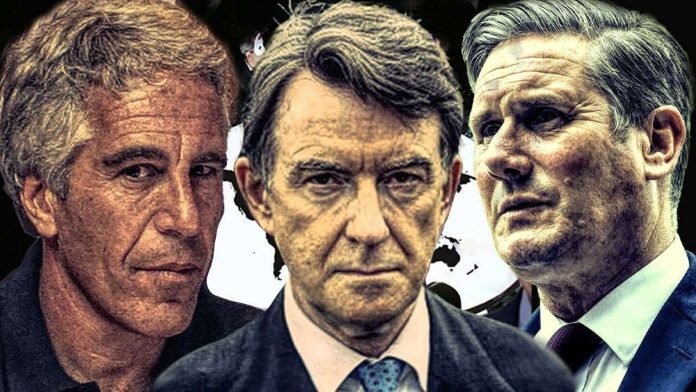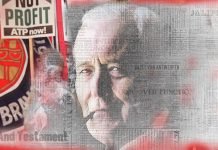Mandelson, Starmer, and Jeffrey Epstein how are they all connected
Starmer brings in Mandelson ‘The Prince of Darkness’ only to put another nail in Labour’s coffin.
Lord Peter Mandelson has been adorned with many monikers, none of them boding well for his reputation. From ‘Mandy’ to ‘The Prince of Darkness’ or even ‘Dark Lord,’ these epithets befit a political career as shady as their implications suggest.
Born on 21 October 1953 in Hendon, Middlesex, Lord Mandelson carries a political pedigree that matches the lofty titled position he holds. His Jewish roots trace back to his father’s family, with his grandfather being the founder of the Harrow United Synagogue. His mother’s side boasts a connection to Herbert Morrison, a prominent figure in London County Council and a Cabinet Minister in the Attlee administration.
From 1985 to 1990, Mandelson served as Labour’s Director of Communications, earning himself the early distinction of being labelled a ‘spin doctor’ and gaining the notorious moniker ‘the Prince of Darkness’ due to his perceived ruthlessness and media savvy. Representing Hartlepool, he served as a Member of Parliament from 1992 to 2004, holding various Cabinet positions under Prime Ministers Tony Blair and Gordon Brown. From 2004 to 2008, he assumed the role of European Commissioner for Trade.
Mandelson played a significant role in rebranding the Labour Party as ‘New Labour,’ alongside individuals like Alastair Campbell and millionaire Roland Rudd, brother of Amber Rudd, the former Conservative Home Secretary.
However, Mandelson’s political career was plagued by controversy and resignations. In one instance, he had to step down from the Cabinet for failing to declare a loan from Treasury Minister Geoffrey Robinson, who was under investigation at the time. This event marked the first time his career was declared deceased, albeit prematurely.
But those who prematurely wrote off Mandelson failed to account for his resilience and the extent to which Tony Blair relied on him. Following his initial resignation, he swiftly returned to the Cabinet, this time as Secretary of State for Northern Ireland. However, his second fall from grace was more convoluted and dramatic, centring around his alleged involvement in lobbying on behalf of Srichand Hinduja for British citizenship. Devastated by the swift abandonment from his Blairite comrades, Mandelson resigned in January 2001.
And yet, Mandelson’s story did not end there. After resigning as an MP in 2004, he embarked on a new chapter as Britain’s European Commissioner for Trade. Despite occasional headlines linking him to investigations, there were no allegations of impropriety—merely the expected confluence of his name with luxury yachts and tycoons.
In 2008, a scandal erupted over Mandelson’s presence on Russian oligarch Oleg Deripaska’s yacht in Corfu. While the media focused more on fellow guest George Osborne and his interactions with Deripaska, Mandelson found himself once again entangled in controversy.
Surviving each scandal, Mandelson resurfaced in the Cabinet for the third time, this time as a Life Peer in the House of Lords. Holding the distinction of being the only person to serve as First Secretary of State as a Peer, his political influence endured.
In addition to his role in shaping New Labour, Mandelson gained notoriety for spearheading the ‘People’s Vote’ campaign, which essentially aimed to remove Jeremy Corbyn from power. Underneath the People’s Vote movement, a parallel campaign operated, discreetly attacking Corbyn and undermining Labour’s stance on Brexit at every opportunity.
The media may not have shed much light on this covert campaign, but it provided an avenue for Labour MPs to garner public support while openly criticising and destabilising Corbyn. This was evident in the defection of Chuka Umunna and the subsequent formation of ‘Change UK.’
Others, such as Starmer, Watson, Thornberry, David Lammy, and others, indirectly undermined the Labour leadership and its firm stance against a second referendum by publicly aligning themselves with Mandelson’s People’s Vote movement. In doing so, they compromised the unity and policy coherence within the Labour Party, much to the chagrin of its members and supporters.
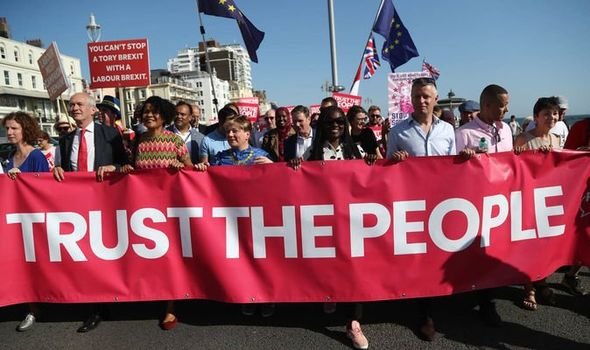
Owen Jones, known for his left-wing perspectives, critically analysed the People’s Vote movement, specifically highlighting its consistent attacks on former Labour leader Jeremy Corbyn and the Labour Party. This raised suspicions of a hidden agenda aimed at hindering progressive voices in the United Kingdom.
Corbyn has committed to a people’s vote, so why do remainers still attack him?
Owen Jones
Among those on the Left, it was clear that Open Britain and the People’s Vote campaign had a broader agenda.
Corbyn supporters in the main recognised that anyone associated with the People’s Vote movement was likely part of the “ABC” (Anyone But Corbyn) movement, political opponents seeking to undermine Corbyn’s leadership.
The People’s Vote campaign was a cynical attempt to lead die-hard supporters of remaining in the EU on a journey of futile hope. Despite the Tory government’s fervent backing of remain in the 2016 referendum, and the extensive use of government resources, they still failed to win the argument for remaining.
Now that the country was run by Prime Minister Boris Johnson, the man who led the leave campaign, it was clear that the government would staunchly campaign to leave the EU if a second referendum were to materialise. Even if the Conservative Party were to entertain the idea of a second referendum, it would undoubtedly result in political suicide for them.
Mandelson’s People’s Vote movement, despite its momentum and support from prominent figures like Starmer, Watson, Thornberry, David Lammy, and others, was always ultimately going to prove futile in achieving its overt objective of a second referendum to remain in the EU.
However, Mandelson did succeed in using the movement to garner enough support from Labour activists and frontbenchers to push Labour into an untenable position of having a manifesto policy for a second referendum.
It helped to have his fellow Trilateral Commission member Sir Keir Starmer on the front bench acting as the Shadow Brexit secretary, a front bencher that insisted his second referendum policy was on the manifesto.
This was a major coup for Mandelson, as it helped to remove Jeremy Corbyn from power and neutralize the threat he posed to the establishment. It also placed Starmer in a position to become leader of the Labour Party.
It was clear to most that Mandelson’s objective was always to undermine the Corbyn Labour Party and remove Corbyn from its leadership. The People’s Vote campaign was simply a means to an end for Mandelson.
The masks slip as the People’s vote is shown to be an anti-Corbyn pro-business front.
If you needed more proof, Mandelson telegraphed his intentions.
Lord Mandelson was infamously recorded stating “he is working every day to undermine Jeremy Corbyn” Mandelson, who has made no secret of his antipathy to Corbyn’s leadership, he added: “Why do you want to just walk away and pass the title deeds of this great party over to someone like Jeremy Corbyn? I don’t want to, I resent it, and I work every single day in some small way to bring forward the end of his tenure in office.
“Something, however small it may be – an email, a phone call or a meeting I convene – every day I try to do something to save the Labour Party from his leadership.”
In response, a Labour source hit back at the peer, suggesting Mandelson was part of the establishment. “The idea of Jeremy Corbyn being prime minister and implementing policies that actually benefit the people terrifies the establishment, so it’s no surprise Peter Mandelson has found time in his busy schedule of spending time on oligarch’s yachts to attempt to undermine him,” the source said.
Here we touch on the real reasons why Mandelson so despised Corbyn.
Corbyn had literately declared war on a fixed system he had dared to challenge the status quo. Corbyn’s policies would have gone some way to redressing the inequalities within the UK and if he had succeeded here the momentum could well have travelled like a wave across the EU changing the world’s social-economic system and losing the establishment’s grip on the people.
Historically it cannot be denied both Lord Mandelson’s so-called people’s vote and Sir Keir Starmer’s vote-losing second referendum policy were instrumental in Corbyn’s downfall.
Mandelson a leader of the “People’s Vote” campaign, persuaded Labour to run on a second referendum on Brexit policy in the December 2019 election.
Mandelson was publicly claiming he wanted to stop Brexit, in a campaign that caused a great deal of difficulty to Labour’s left-wing leader Jeremy Corbyn, while he or his representatives were privately hosting discussions between Tory Minister Gove and many investment firms treating Brexit as a done deal and a business opportunity.
Whereas Starmer, Labour’s former Shadow Brexit secretary and architect of the vote-losing Brexit policy continued to use the hopes of the remain camp to carry him onto becoming leader of the Labour party, only to turn around once secure as leader, ironically repeating the three words used by the Tories to win the general election “Get Brexit done!“.
As Diane Abbott later said of Starmer: ‘Having been Mr Remain’ you ‘don’t hear much about remain now’
Obviously, the job was done, the primary mission of removing Corbyn was complete. Globalisation and the establishment were rendered safe from the populist.
Both Trilateralist could now turn their attention to making the Labour Party indistinguishable from the Tories, taking away the democratic choice, no longer would the Labour Party be an alternative to the Tory Party but an alternative Tory Party.
The Dark Side of Politics
Starmer and Mandelson have many things in common and many things they don’t like us to know.
Of course, other than both being members of the Labour Party and the fact they both have establishment titles, one being a knight of the realm and the other a Lord, both Starmer and Mandelson have deeper links. They are both connected to organisations that over the last four decades have lent themselves to many conspiracy’s.
Lord Mandelson and Sir Keir Starmer are Trilatrilist, members of an elite organisation that believe emphatically in globalisation.
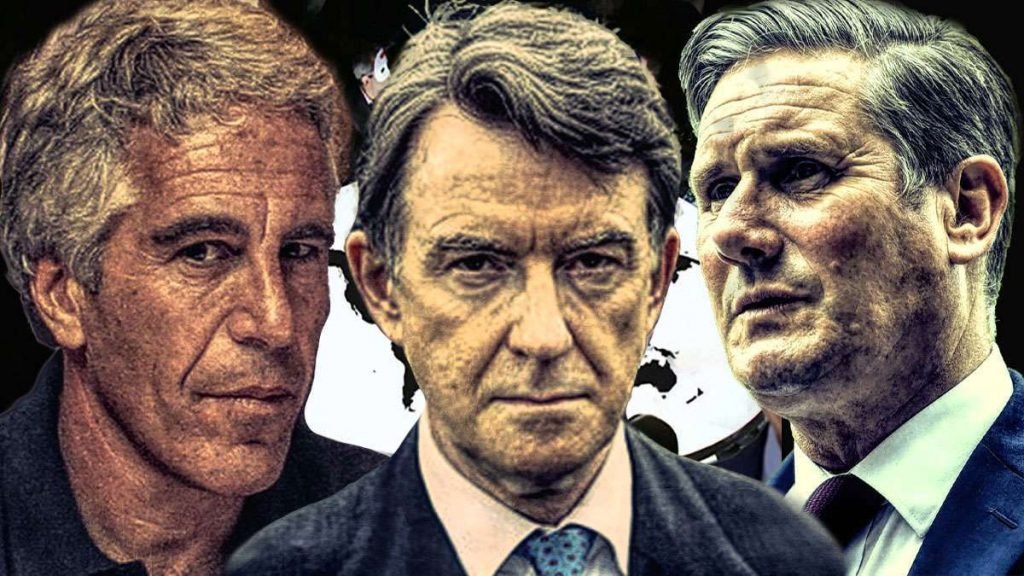
As their name suggests they have a vision of a world divided into three, The Americas, Europe and Asia, an organisation that believes the crisis of democracy lies in the fact there is too much democracy, too many people have a say, they are an elite organisation that feel the biggest stakeholders, the rich and powerful should be the ones to make the decisions, after all, they have more of a stake in society, they own more.
If that was not bad enough the fact the organisation had members like Jeffrey Epstein leaves it with nothing to be desired.
Here’s where the links get even murky.
The Epstein story is probably one of the biggest scandals of the last decade. We are talking here about sex trafficking, paedophilia, rape, blackmail, financial fraud, intelligence agencies etc. And that spider web involves the most powerful and wealthiest people internationally (perhaps this is the answer).
Yet there was barely any investigative journalism. Most of the coverage done by journalists was barely scratching the surface, the tip of the iceberg.
One of the most surprising things about Epstein is that he is a member of some of the most powerful and influential groups in the US.
He’s a member of:
- The Council on Foreign Relations
- The Trilateral Commission
- Trilateral North American Group
Coincidently Joe Biden is a member of ‘The Council on Foreign Relations’ another murky organisation of elitists.
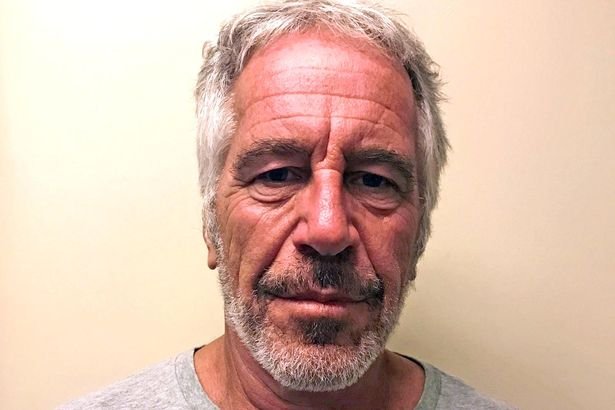
Mandelson may be a Trilatrilist, but he is also a Bilderberger, his fingers seem to be in every pie.
There seems to be a big crossover, after all the one percent is only one percent and you cannot have too many groups without doubling up a little.
As we know Sir Keir Starmer is a member of ‘The Trilateral Commission,‘ an organisation that sees the issue with democracy as the fact that people like you and me have the vote. They feel that the vote should be only for those with what they believe is a real stake in democracy, they see it as the rich have more to lose!
The secretive Bilderberg Group gathers for its annual meetings. A collective of elite North American and European politicians, business leaders, financiers and academics, the group has attracted a good deal of suspicion over the last half-century, with conspiracy theorists confidently asserting that its members are plotting the New World Order and are hell-bent on global domination.
Protesters who believe the Bilderbergers represent a “shadow world government” regularly picket their yearly meet-ups, creating a need for high security at all times, but attendees insist the group is simply a debating society taking place outside the glare of the political spotlight.
The group publishes its guest list the day before its annual get-together – between 120 and 150 are invited by its steering committee – along with a list of the subjects they intend to discuss as a gesture towards transparency. This typically consists of broad issues like macroeconomic concerns, the threat of terrorism and cyber-security.
Although members do not, as a rule, discuss what goes on within its conferences, Labour MP and one-time party deputy leader Denis Healey, a member of the steering committee for more than 30 years, did offer a clear statement of its intentions when quizzed by journalist Jon Ronson for his book Them in 2001.
“To say we were striving for a one-world government is exaggerated, but not wholly unfair,” he said. ”Those of us in Bilderberg felt we couldn’t go on forever fighting one another for nothing and killing people and rendering millions homeless. So we felt that a single community throughout the world would be a good thing.”

Here’s Mandy – or should I say, the chairman of Lazard International or his other title Board of Trustees of Deutsche Bank’s – Mandelson perfectly embodies the ghastly, muddy fudge of public and private that so typifies the atmosphere at Bilderberg. Throw a rock and hit a public servant turned investment banker. Alongside Mandelson in the 2014 Bilderberg meeting was his old buddy and sailing partner George Osborne another beneficiary of the “revolving door”.
If you have ever wondered how Sir Keir Starmer could go from being first elected in 2015 as a Labour MP to Labour Leader in 5 years, That’s one parliamentary term, maybe look at his friends and the organisations he belongs to.
Lord Mandelson wasn’t afraid to phone Jeffery Epstein looking for a favour — even while the paedophile was behind bars for sex crimes, according to a new documentary.
A new “Dispatches” documentary aired on Channel 4 claims Lord Peter Mandelson was Labour Business Secretary in 2009 when he called Epstein — then cooling his heels in a Florida jail after pleading guilty to procuring an underage prostitute — trying to arrange a meeting with the boss of JP Morgan bank, according to newspapers.
Epstein and Mandelson were seemingly so close that Epstein even had a pet name for the UK cabinet member — calling him “Petie,” according to the report.
“I must say I was astonished that a British Cabinet minister at that time, probably the most powerful man other than the Prime Minister, was calling Jeffrey in jail,” a friend of Epstein’s who revealed the call told the documentary
Both Sir Keir Starmer and Lord Mandelson have connections in common the notorious Jeffery Epstein
“I pledge allegiance to the Trilateral Commission, and to the domination for which it stands, one planet, indivisible, with tyranny and poverty and top-down order for all…”
Epstein’s connections to the rich powerful and famous spread like a spider’s web including royals. politicians, Bankers and celebrities, he was even a member of The Trilateral Commission a small exclusive club of some of the most powerful people in the world a club Sir Keir Starmer belongs to. LINK
The Trilateral Commission, of which Starmer is a member. Other members include top executives of multinational conglomerates such as AT&T and ITT. Oil companies such as Mobil and Exxon, but also the top C.E.Os of the Chase Manhattan Bank, First Chicago Corp, General Electric, TRW, Archer Daniels Midland, Pepsi, RJR Nabisco, Nissan, Toshiba, Fuji Bank and Goldman Sachs.
Peter Mandelson pictured with Jeffrey Epstein: Labour ex-minister who’s friends with Prince Andrew shops with paedophile financier in 2005 after being introduced by Ghislaine Maxwell
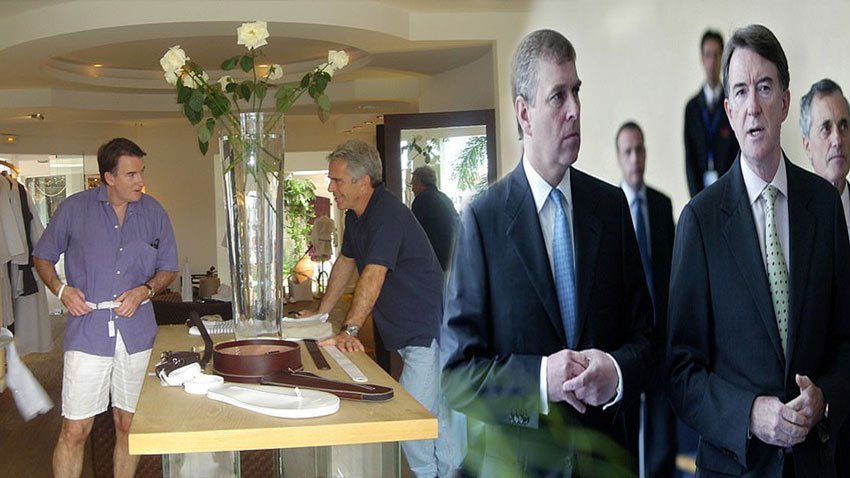
Starmer’s name first appeared on the membership list of the Trilateral Commission in April 2019. Out of 650 MPs, he was the only one invited to become a member. These perhaps aren’t the sort of people Sir Keir would see as an ideal photo opportunity, to be used in his campaign highlighting his “lefty credentials”.
What we have is Sir Keir Starmer, as part of an organisation that Holly Sklar, who edited a book on the organisation entitled “Trilateralism: The Trilateral Commission and Elite Planning for World Management”, identifies as the commission that “represents the interests of multinational corporations and banks”. This means it is contrary to the interests of so-called ‘non-developed’ countries and workers the world over.
It wants wages kept low. It wants voters kept apathetic and polarised.
Sklar states that the Trilateral Commission “is not a conspiracy” and is not “omnipotent… “But that doesn’t mean it’s not influential.” The Commission set out to economically “co-opt” OPEC to persuade the Saudis to put their petrodollars into Western banks and to purchase Western arms, rather than investing in the developing world.
In an explosive interview with two Trilateral Commission members, highlighting how much political power can be controlled in the hands of a few, this stunning piece of forgotten history, a 1978 conversation between a US reporter and two members of the Trilateral Commission. (Source: Trilateralism: The Trilateral Commission and Elite Planning for World Management; ed. by Holly Sklar, 1980, South End Press, Pages 192-3).
Goodbye, Nation States.
Any doubt on the question of TC goals is answered by David Rockefeller himself, the founder of the TC, in his Memoirs (2003): “Some even believe we are part of a secret cabal working against the best interests of the United States, characterizing my family and me as ‘internationalists’ and of conspiring with others around the world to build a more integrated global political and economic structure—one world, if you will. If that is the charge, I stand guilty, and I am proud of it.”
The 1978 conversation featured reporter, Jeremiah Novak, and two Trilateral Commission members, Karl Kaiser and Richard Cooper. The interview took up the issue of who exactly, during President Carter’s administration, was formulating US economic and political policy.
How does a shadowy group like the TC accomplish its goal? One basic strategy is: destabilise nations; ruin their economies; ratify trade treaties that effectively send millions and millions of manufacturing jobs off to places where virtual slave labour does the work; adding insult to injury, export the cheap products of those slave factories back to the nations who lost the jobs and undercut their domestic manufacturers, forcing them to close their doors and fire still more employees.
And then solve that economic chaos by bringing order.
What kind of order?
Eventually, one planet, with national borders erased, under one management system, with a planned global economy, “to restore stability,” “for the good of all, for lasting harmony.”
Noam Chomsky: Neoliberalism Is Destroying Our Democracy
How elites on both sides of the political spectrum have undermined our social, political, and environmental commons.
Chomsky on Crisis of Democracy by Trilateral Commission
Noam Chomsky says the Trilateral Commission’s aim is to bring about a moderation in democracy to allow only the elite to vote. A backwards step in democracy and the working-class movement.
Social critic and academic Noam Chomsky has criticised the commission as undemocratic, pointing to its publication The Crisis of Democracy, which describes the strong popular interest in politics during the 1970s as an “excess of democracy”.
Chomsky described it as one of the most interesting and insightful books showing the modern democratic system not to really be a democracy at all, but controlled by elites.
Apathy and obedience.
Two documents came out right in the mid-’70s, which are quite important. They came from opposite ends of the political spectrum, both influential, and both reached the same conclusions. One of them, at the left end, was by the Trilateral Commission—liberal internationalists, three major industrial countries, basically the Carter administration, that’s where they come from.
That is the more interesting one [The Crisis of Democracy, a Trilateral Commission report]. The American rapporteur Samuel Huntington of Harvard, he looked back with nostalgia to the days when, as he put it, Truman was able to run the country with the cooperation of a few Wall Street lawyers and executives. Then everything was fine. Democracy was perfect.
But in the ’60s they all agreed it became problematic because the special interests started trying to get into the act, and that causes too much pressure and the state can’t handle that. We have to have more moderation in democracy.
THE CURE FOR DEMOCRACY IS MORE DEMOCRACY.” HE SAID,
“NO, THE CURE FOR THIS DEMOCRACY IS LESS DEMOCRACY.
“The cure for democracy is more democracy.” He said, “No, the cure for this democracy is less democracy.”
This is the liberal establishment. This is a consensus view of the liberal internationalists and the three industrial democracies. They—in their consensus—they concluded that a major problem is what they called, their words, “the institutions responsible for the indoctrination of the young.” The schools, universities, and churches, they’re not doing their job. They’re not indoctrinating the young properly. The young have to be returned to passivity and obedience, and then democracy will be fine. That’s the left end.
Now, what do you have at the right end? A very influential document, the Powell Memorandum, came out at the same time. Lewis Powell, a corporate lawyer, later Supreme Court justice, he produced a confidential memorandum for the US Chamber of Commerce, which has been extremely influential. It more or less set off the modern so-called “conservative movement.” The rhetoric is kind of crazy. We don’t go through it, but the basic picture is that this rampaging left has taken over everything. We have to use the resources that we have to beat back this rampaging New Left which is undermining freedom and democracy.
Connected with this was something else. As a result of the activism of the ’60s and the militancy of labor, there was a falling rate of profit. That’s not acceptable. So we have to reverse the falling rate of profit, we have to undermine democratic participation, what comes? Neoliberalism, which has exactly those effects.
Chomsky says that as it was an internal discussion they “let their hair down” and talked about how the public needs to be reduced to its proper state of apathy and obedience. Essentially liberal internationalists from Europe, Japan and the United States, the liberal wing of the intellectual elite.
The Trilateral Commission are concerned with trying to induce what they call a “more moderation in democracy”—turn people back to passivity and obedience so they don’t put so many constraints on state power and so on. In particular, they were worried about young people.
They are concerned about the institutions responsible for the indoctrination of the young (that’s their phrase), meaning schools, universities, church and so on—they’re not doing their job, [the young are] not being sufficiently indoctrinated. They’re too free to pursue their own initiatives and concerns and you’ve got to control them better.
Critics accuse the Commission of promoting a global consensus among the international ruling classes in order to manage international affairs in the interest of the financial and industrial elites under the Trilateral umbrella.
It’s very hard to understand how Sir Keir Starmer thinks belonging to this elitist group that believes the crisis of democracy is the fact the working classes having a say in democracy will enhance the cause of socialism or the working class.
Help Us Sustain Ad-Free Journalism
Sorry, I Need To Put Out the Begging Bowl
Independent Journalism Needs You
Our unwavering dedication is to provide you with unbiased news, diverse perspectives, and insightful opinions. We're on a mission to ensure that those in positions of power are held accountable for their actions, but we can't do it alone. Labour Heartlands is primarily funded by me, Paul Knaggs, and by the generous contributions of readers like you. Your donations keep us going and help us uphold the principles of independent journalism. Join us in our quest for truth, transparency, and accountability – donate today and be a part of our mission!
Like everyone else, we're facing challenges, and we need your help to stay online and continue providing crucial journalism. Every contribution, no matter how small, goes a long way in helping us thrive. By becoming one of our donors, you become a vital part of our mission to uncover the truth and uphold the values of democracy.
While we maintain our independence from political affiliations, we stand united against corruption, injustice, and the erosion of free speech, truth and democracy. We believe in the power of accurate information in a democracy, and we consider facts non-negotiable.
Your support, no matter the amount, can make a significant impact. Together, we can make a difference and continue our journey toward a more informed and just society.
Thank you for supporting Labour Heartlands
